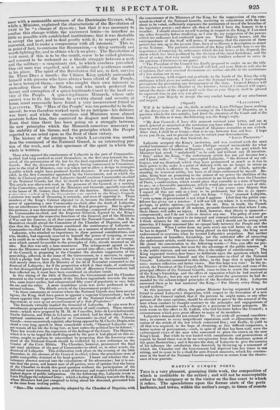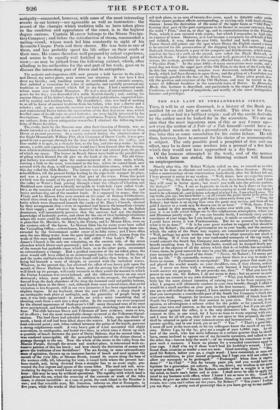MARTIN'S CINQUE PORTS.
THIS is a very pleasant, gossiping little work, the composition of which is creditable to the author ; and will not be unacceptable either to the antiquary or to the visitor on the fine coast to which it refers. The speculations upon the former state of the ports harbours, and towns, within the author's range, in times of remote antiquity--connected, however, with some of the most interesting events in our history—are agreeable. as well as instructive: the record of the changes which tradition tells us have taken place in the condition and appeafance of the coast, is in the highest degree curious. Captain MARTIN belongs to the Steam Naviga- tion Company; and before the introduction of steam, commanded a sailing-vessel, -whose track led him constantly in sight of his favourite Cinque Ports and their shores. He was born in one of them, and has probably spent his life either on their sands or their seas. He comes therefore well prepared by actual experience, and seems to be equally well fortified in a traditional point of view ;—as may be judged from the following extract, which, after alluding to his authorities for the oral part of his work, goes on to discuss the interesting port of Dover and its antiquities.
The majestic and stupendous cliffs now present a bold barrier to the tides; and Dover, my native place, next arrests our attention. It was here I first drew my breath; and, rambling among its castellated and romantic scenery, first imbibed a veneration for relics of antiquity, and carefully preserved any tradition or historic record which fell in my way. I had a maternal uncle whose name was Gallant Hampton. He was a man of extraordinary intelli- gence for his day ' • was descended of a noble Kentish family ; and, uniting the ancient library ofhis father's house with periodical publications, supported him- self by reading and lending books. My grandfather, also, was fond of reciting to us all he knew of aneient tradition from his father, Nilo was a doctor and a scholar ; and, as my venerable ancestor NVilS born in the reign of Queen Anne, and remembered Dover before the innovations of the first American war, xvhich levelled some of its old ruins to erect batt,:ries, we were highly interested by his descriptions. These, and an old cccentrie gentleman, Tommy Pattentlen, were any authors, from whose antiquarian researches I obtained the following tradi- tions of Dover localities.
The caeale, built by the Romans soon after their invasion of Britain, was no doubt intended as a defence for a much more important harbour or haven than Dover at present possesses. III a survey ordered during the administration of the Right Honourable William Pitt, then Governor of Dover Castle, it was pro- posed to cut a passage through for the river which flows from the valley, and thus enable it to pass, in a straight hue, to the bay, and into deep water : by this means, a noble and capacious harbour would have been formed after the descrip- tion which tradition has handed down to us of its first and ancient port, the proofs of which are many. T he houses in Bench Street were built on the parallel lines of piling which formed the old pier on the bank of the river. The old three- gun battery was erected upon the commencement of its stone mole, which, curving a fittle to the west, terminated in the bay, where its ruined head, now covered with the deep, is still recognized in its foundation-stones, which are to this day called the Mole Rocks. The battery was a play-ground for myself and schooltellows, till the present bridge leading to the rope-walk usurped its place, and was a great improvement to that part of the town. From this point (which was the mouth of the port) the sea flowed in an uninterrupted course up the valley to Water's End, passing through where the villages of Charlton and Buckland now stand, and evidently navigable to Crab-hole (now called Crab- ble), as the remains of naval architecture have been found in that bottom, and heavy anchors dug out of the meadow lands. It is supposed by many, that the Priory and Le Maison Dieu were erected on the ruins of Roman fortifications, which then stood on the bank of the haven : be that as it may, the magnificent baths which were discovered beneath the vaults of St. Mary's Church, showed by their arrangement that a river or aqueduct had been in the immediate vicinity for their supply ; and whoever has observed the Roman baths, in the Italian . dotninions, will immediately perceive that the ancients hail not the slightest . Imowledge of hydraulic power, and chose for the site of their buildings situations where the water could be conducted through without any difficulty. Hence it is plain that St. Martin's St. Mary's, the Priory, and Le Maison Dieu, were on the western side of the haven. Le Maison Dieu has for many years been called the Victualling Office,—a brewhouse, butchery, and bakehouse having been con- structed by the Government under cover of its lofty rums; and I have often seen the tars filling water from the pure limpid stream which, issuing from the walls of this once splendid nunnery, is still called "Our Lady's Well." St. . James's Church is the only one remaining, on the eastern side, of the seven churches which Dover once possessed ; and we now come to the consideration of the remote but probable cause which here, as in the other parts, occasioned so extraordinary a change. Had a gradual recession of the sea taken place, the river would still have ebbed in an uninterrupted line to the bosom of the deep ; and the moles and bulwarks lifted their heads still loftier than before, in lieu of being hid beneath a mass of shingle, or covered with the turbulent waves. Whoever, in the present day, has observed the effect of one heavy gale upon the mouth of? Dover Harbour in a few hours, and the moving bar of shingle which will block up its passage, will easily reconcile to their minds the manner in which the Portus Lernanus was overwhelmed, and the different havens on our coast destroyed ; when, most probably, in addition to the tempest, the earthquake heaved from the dark chambers of the deep the loosened sand awl pebbly bottom, and hurled them to the shore : and, although from some natural cause, that awful visitation is less frequent, still in our own memories it has been experienced in a slighter degree. In my boyhood, about the year 1797-98, a sharp shock of an earthquake took place at midnight, and, the generality of people being at rest, it was little appreciated : it awoke me with a noise resembling that of shooting coals from a cart into a deep cellar. In the morning we were surprised by the altered appearance of Shalespeare's Cliff: many thousand tons of its crest were precipitated, and formed a chalky promontory, stretching into the sea at its base. The cliffs between Dover and Folk-stone all bore evidence, more or less, of its effects ; but the most remarkable change occurred at the Folkstone Signal- station. The land there had subsided considerably ; while, upon the shore be- . Beath, a bank of soil had been lifted above the waters. It had the appearance of lead-coloured paint; and, when rubbed between the palms of the hands, gave out a strong sulphureous smell. A very heavy gale of wind succeeded this slight convulsion, or earthquake, and lasted two days, in which time it threw up such .a quantity of beach between the piers of Dover Habour, that for several tides it was rendered unnavigable, till the powerful backwater of the sluices cleared a rm:
through to the sea. Now the whole of the strata in the valley from the
Parade, through the streets and market-place' is intermixed with ex- tensive patches of this sea beach; and how clearly the derivation of names will prove the traditions of our forefathers ! The sea having, in some extraordinary :state of agitation, thrown up an immense barrier of beach and sand against the anouth of the river Idle, or Stream Brook, turned its course along the base of the western cliffs, till, labouring for vent, it issued forth where the present har- bour stands, and, being diverted from a straight line to an acute angle, pre- vented the free ingress and egress of the ocean tides. The sand and soil, accu- mulating by degrees, would soon occupy the space of a capacious haven or har- bour: this may be seen by artificial operations. The rapidity with which land is gained from the sea, when the scouring of the currents or wash of the tides cease, is almost incredible : as a case in point, the sunk island in the Humber is one; and that scientific man, Mr. Smeaton, informs us, that at Ramsgate, in five years, while the works of that harbour were neglected, an accumulation of soil took place, in an area of twenty-five acres, equal to 260,000 cable yard,. Similar causes produce effects corresponding, or varying only with local eireum- stances : hence the derivation of the name of the upper basin or "Old Pent'. forming that part of the port contiguous to its former or ancient entrance, from the word " Pent," shut in, or shut up, and in contradistinction to the Paradise Pent, which is now covered with streets, but which I remember in high tides an expanse of water. However, as it had become a receptacle for all kinds of filth and rubbish, it was, about the year 1805, levelled and built upon. Round Tower Street still points out the spot where Henry the Eighth caused a tower to be erected for the preservation of the shipping lying in this anchorage ; and Bulwark Street, formerly a part of the ramparts and fortifications, which termi_ nated at the base of a rock on the strand, now called the Black Bulwark, or Bulwark Rock. Under shelter of this ancient wall, protected from enemies and storms, the seaman, grateful for the security afforded him, called the anchorage " Paradise Pent." In the years 1805-8 many excavations were made, and a canal dug out from the upper part of the Old Pent, to the foot of the Castle Hill. In this line many interesting remains were discovered, imbedded in the sea beach, which had been thrown in upon them; and the piling of a foundation wu cut through, parallel to the line of the Bench Street. Many other proofs idea- tify the position and existence of the Old Harbour, and may be traced in the names of different localities in the venerable town of Dover. In Doomsday Book, this harbour is described, and particularly in the reign of Edward the Confessor, as being a port of magnitude, and worthy of ,the most distinguished honours and privileges.



















































 Previous page
Previous page